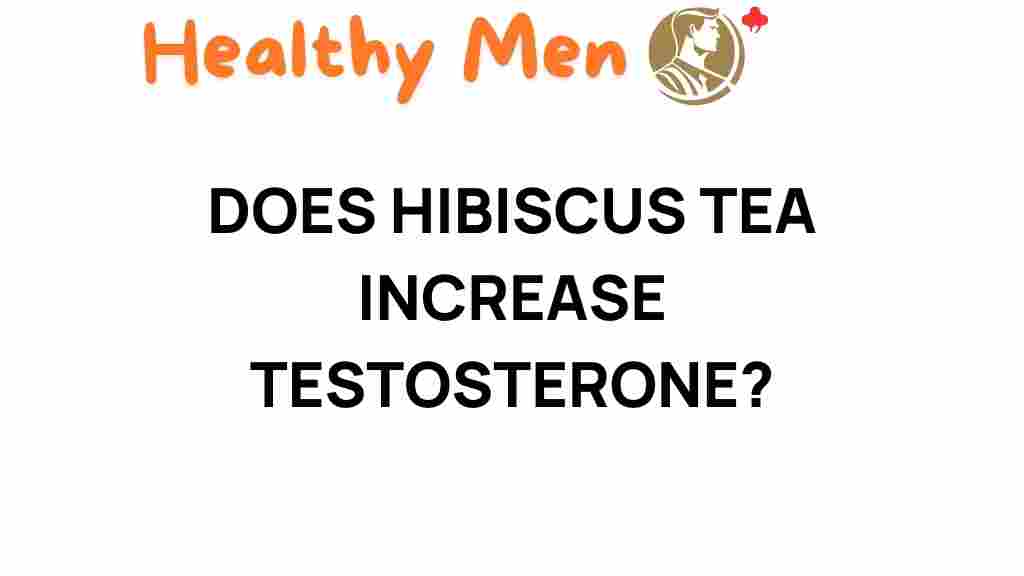Unveiling the Truth: Does Hibiscus Tea Boost Testosterone Levels?
In recent years, there has been a growing interest in natural remedies for improving health and wellness, particularly among men seeking to enhance testosterone levels. One such remedy that has gained popularity is hibiscus tea. Known for its vibrant red color and refreshing taste, hibiscus tea is not only enjoyed for its flavor but also for its purported health benefits. This article will explore the relationship between hibiscus tea and testosterone levels, as well as its broader implications for male wellness.
The Health Benefits of Hibiscus Tea
Hibiscus tea, made from the dried calyces of the hibiscus flower, is rich in antioxidants and has been used in traditional medicine for centuries. Its health benefits include:
- Rich in Antioxidants: Hibiscus tea is packed with antioxidants such as flavonoids and phenolic acids that help combat oxidative stress.
- Supports Cardiovascular Health: Research has shown that hibiscus tea can help lower blood pressure and improve overall heart health.
- Promotes Digestive Health: The tea has mild diuretic properties, aiding in digestion and promoting healthy kidney function.
- Enhances Immune Function: The vitamin C content in hibiscus tea can help boost the immune system.
Hibiscus Tea and Hormonal Balance
One of the most intriguing aspects of hibiscus tea is its potential effect on hormonal balance, particularly testosterone levels. Testosterone is an essential hormone for male health, affecting everything from muscle mass to mood. Given the increasing awareness of the importance of hormonal health, many are turning to herbal remedies like hibiscus tea as a natural supplement.
Does Hibiscus Tea Boost Testosterone Levels?
The question of whether hibiscus tea can boost testosterone levels is complex. While there is limited direct research on hibiscus tea’s effects on testosterone, some studies suggest that the compounds present in hibiscus may influence hormone levels in a positive way.
Scientific Studies and Findings
A study conducted on male rats revealed that hibiscus extract had a significant effect on testosterone levels. The exact mechanisms are still being investigated, but it is believed that the antioxidants in hibiscus may help reduce oxidative stress, which can negatively impact testosterone production.
Another study published in the journal Phytotherapy Research highlighted the potential of hibiscus to modulate hormonal balance. The findings indicate that hibiscus extract might help maintain healthy testosterone levels by reducing estrogenic activity, which is crucial for male wellness.
Incorporating Hibiscus Tea into Your Dietary Choices
If you’re considering adding hibiscus tea to your routine to potentially support testosterone levels or overall health, here are some steps to help you get started:
Step-by-Step Process to Brew Hibiscus Tea
Making hibiscus tea is simple and can be done at home. Follow these steps:
- Gather Ingredients: You will need dried hibiscus flowers, water, and optional sweeteners or additional flavors (like honey or lemon).
- Boil Water: In a pot, bring 4 cups of water to a boil.
- Add Hibiscus Flowers: Once the water is boiling, add 1/2 cup of dried hibiscus flowers.
- Simmer: Reduce the heat and let the mixture simmer for approximately 15-20 minutes.
- Strain and Serve: Remove from heat, strain the tea into cups, and enjoy hot or cold.
Tips for Enjoying Hibiscus Tea
To maximize the health benefits of hibiscus tea, consider these tips:
- Drink Regularly: Aim to incorporate hibiscus tea into your daily routine for consistent benefits.
- Combine with Other Herbs: Mixing hibiscus tea with other herbal remedies such as ginger or peppermint can enhance flavor and health benefits.
- Monitor Your Body: Pay attention to how your body responds to hibiscus tea, as individual reactions may vary.
Potential Side Effects of Hibiscus Tea
While hibiscus tea is generally safe for most people, it is essential to be aware of potential side effects, especially when consumed in large quantities:
- Blood Pressure Effects: Hibiscus tea can lower blood pressure, which may be a concern for those on antihypertensive medications.
- Allergic Reactions: Some individuals may experience allergic reactions to hibiscus.
- Pregnancy and Breastfeeding: Pregnant or breastfeeding women should consult their healthcare provider before consuming hibiscus tea.
Troubleshooting Tips
If you encounter any issues while brewing or consuming hibiscus tea, consider the following troubleshooting tips:
- Too Tart? If the tea is too tart for your taste, try adding a natural sweetener like honey or agave syrup.
- Not Strong Enough? Increase the quantity of hibiscus flowers or steep the tea for a longer time.
- Feeling Unwell? If you experience any adverse reactions, discontinue use and consult a healthcare professional.
Conclusion: A Natural Approach to Male Wellness
In conclusion, while the evidence surrounding hibiscus tea and its ability to boost testosterone levels is still emerging, its rich profile of antioxidants and potential hormonal balancing effects make it a valuable addition to your health regimen. As part of a holistic approach to male wellness, incorporating hibiscus tea into your dietary choices can provide numerous health benefits.
As with any natural supplements or herbal remedies, it’s essential to approach with caution and consult healthcare professionals, especially if you have underlying health conditions or are taking medications. By making informed dietary choices and embracing natural remedies, you can enhance your overall health and well-being.
For more information on maintaining hormonal balance and exploring additional herbal remedies, check out our article on natural approaches to health.
Embrace the power of hibiscus tea today and discover its potential benefits for your health journey!
This article is in the category Nutrition and created by healthymen Team
